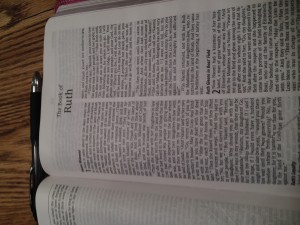Naomi’s Story Redeemed
 As we celebrated Mother’s Day yesterday, I thought of Naomi, mother of Mahlon and Chilion in the book of Ruth.
As we celebrated Mother’s Day yesterday, I thought of Naomi, mother of Mahlon and Chilion in the book of Ruth.
With a pain of loss I can only imagine, she decided to travel from the enemy country she’d been living in, back to her homeland in Bethlehem, Israel. Beyond childbearing years, the widow Naomi had no hope of ever having children again.
Naomi spoke from a broken place in the Moab desert. “For the hand of the Lord has gone forth against me.”
She had endured so much pain that she stopped believing in the goodness of God. She could only see her circumstances as God’s punishment.
Is suffering always a result of our own sin?
A commentary I read asserted that Naomi had sinned by traveling to Moab in the first place, and that she was only returning to Israel in search of food, but I don’t see any evidence in the book of Ruth. That notion is implausible for two reasons:
1) Unlike post-1950’s American women, ancient Middle Eastern women would have had little say in where they moved.
2) More than once God’s people escaped famine by traveling to Egypt (e.g., Abraham and Jacob’s whole family), so I don’t see why it would have been expressly forbidden for Elimelech to take his family to Moab temporarily in search of better conditions.
Naomi’s words indicate a previous joy, both in the Lord and her circumstances. “The Almighty has dealt very bitterly with me. I went out full, but the Lord has brought me back empty.” She wanted to change her name, which is the Hebrew word for “pleasantness,” to Mara (bitter).
We can’t make a map to navigate a desert we’ve never walked.
Those who fault Naomi for her bitterness, I would argue, have not dealt with such loss before. It’s easy to say, “Don’t be bitter,” if you haven’t lost everything you ever loved.
I’ve heard Christians claim that people who are Christians don’t despair, as if it’s a moral failing. However, it doesn’t take a close reading of the Psalms to realize this notion simply isn’t true. David, a man after God’s own heart, despaired of his life and his circumstances more than once.
Certainly, someone who has faced the death of spouse and children would naturally have moments of rock-bottom emotions, even doubting whether God loves us or whether He is for us.
If we’re honestly seeking a deeper relationship with God, we question what He’s doing sometimes. What three-year-old doesn’t question his parents’ instructions? Is our understanding of God’s ways any more clear than a preschooler’s?
“Why?” is a healthy question for a growing, maturing child of God. 
Sometime after moving to a foreign land and losing her husband and both sons, Naomi had stopped pretending she was okay and admitted that she had hit rock bottom. She was in survival mode. All she knew was that the famine seemed to be over in Israel after ten years, and that she wanted to go back to her homeland.
In other words, she had everything she needed for God to redeem her story: no misguided notion that she could fix her situation, and a determination to get back to Him as quickly as she could. She just didn’t know how He would do it yet.
The way back from bitterness is to honestly talk with God about where we are and how we’re feeling.
We often think of the book of Ruth as God redeeming the young Moabite widow’s story, and it certainly is. Ruth was born into a culture and a religion that didn’t know Him, and He rescued her and brought her into His family. But the book of Ruth also tells about the redemption of Naomi’s story.
Ruth became “better than seven sons” to Naomi. We see the joy back in Naomi’s life with her new little grandson, Obed, in her lap. As the curtains close on Naomi’s story, she’s bouncing a baby boy, whose name means “worshipper,” on her knee. It may not be the ending she imagined in the beginning, when we met her in despair in the middle of enemy country, but her joy has returned nevertheless.

“Ruth Naomi Obed” by Simeon Solomon – Birmingham Museums and Art Gallery. Licensed under Public Domain via Wikimedia Commons – http://commons.wikimedia.org/wiki/File:Ruth_Naomi_Obed.jpg#/media/File:Ruth_Naomi_Obed.jpg
God doesn’t leave us in the pit of despair when we cry for help.
There’s a reason history records her name as Naomi, rather than Mara. Even though she tried to change her name permanently, her bitterness was only temporary. She didn’t see it, but God was working in her life to redeem her story.
And by the way, He also used her story to redeem ours. Baby Obed would grow up and marry, and they would have a baby named Jesse. Jesse fathered David, King of Israel, whom God would covenant to give an everlasting Kingdom. Through David’s bloodline, we’re given Jesus, our Redeemer.
Join the conversation: Have you ever been in a bitter place, where you felt God’s hand against you? How did God redeem your story? Or, if he hasn’t yet redeemed it, how does Naomi’s story encourage you as you walk through it.





The Conversation
When year after year went by of hoping praying and trying to have a child to no avail, I had times when I felt abandoned by God. How could this be I thought when all I’m asking for is to be a Mother. Now I understand that God had a greater plan for me. He graced me with time to understand how much patience I would need to be a Mother. I needed to learn what it meant to lay down my own wants and desires to truly love. So after 13 years of waiting my dream came true and I am still learning!
Jeannette, what a beautiful illustration of waiting on God, even through the times you couldn’t see Him. It always makes me smile to think of your sweet kids and the joy they bring. Thanks for reading and sharing how God redeemed your story.
God hasn’t yet redeemed my story, but I have learned that lesson along the way. The lesson that crying out to God and getting real with Him about our despair and bitterness = worship. Lamenting = worship. So often we feel like we are complaining. I have learned that crying out to God moves us toward Him and that is a good thing. Complaining to others moves us around in circles in our desert of despair and that is NOT a good thing. I am SO glad we worship a God who can hear our cries of joy as well as our anguish and still love us unconditionally. I needed this reminder, Lyneta! Thank you for your words so poignantly written.
Maresa, I continue to pray for your story to be redeemed. I loved your reminder about crying out to God vs. complaining to others. So true!